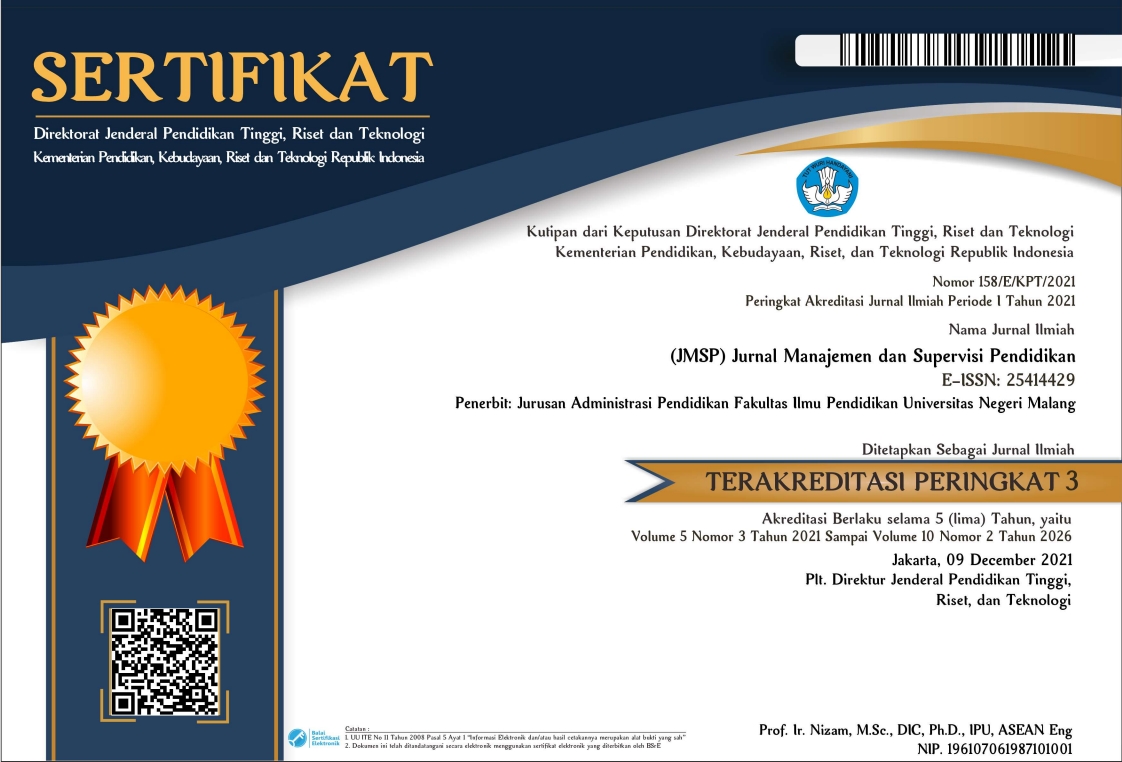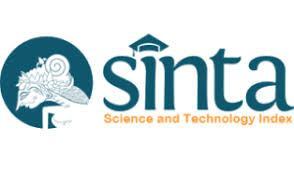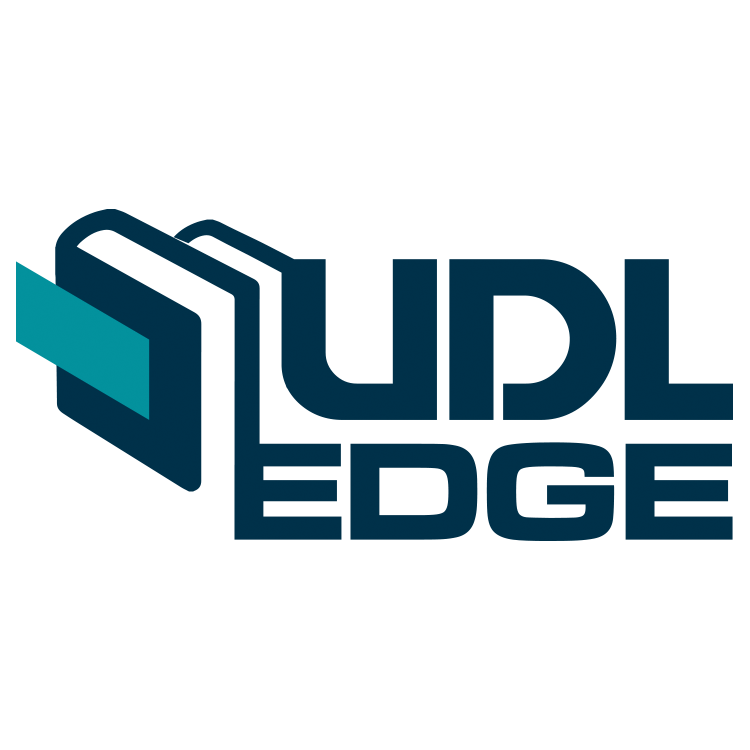PENGEMBANGAN INSTRUMEN PENGUKURAN IKLIM SEKOLAH BERBASIS WEB
Abstract
Abstrak: Penelitian ini bertujuan menghasilkan menghasilkan produk berupa sistem informasi iklim sekolah berbasis web. Desain penelitian ini menggunakan kombinasi antara research and development (R dan D) dengan design and development (D dan D). Pengembangan sistem informasi iklim sekolah melibatkan berbagai stakeholder pendidikan di Kabupaten Gunungkidul Provinsi Daerah Istimewa Yogyakarta khususnya pada jenjang SMA/SMK dan yang sederajat. Berdasarkan hasil uji coba yang dilakukan dalam dua tahap di dua sekolah berbeda di Kabupaten Gunungkidul, sistem informasi pengukuran iklim sekolah berbasis website layak digunakan dan diaplikasikan khususnya pada tingkat sekolah menengah atas dan kejuruan. Pemanfaatan web iklim sekolah dapat membantu kepala sekolah mengidentifikasi situasi sekolah dan di sisi lain warga sekolah terlibat langsung dalam proses memperbaiki sekolahnya dengan memberikan penilaian tentang iklim sekolahnya. Sistem ini patut didiseminasikan dan disosialisasikan kepada sekolah-sekolah dalam lingkup yang lebih luas. Namun demikian terdapat catatan khusus dari segi pengguna khususnya orangtua. Dari kesemua unsur pengguna, orangtua memiliki keterbatasan dalam memanfaatkan website karena hambatan literasi internet dan akses yang belum merata. Oleh karena itu, khusus bagi kalangan orangtua, direkomendasikan agar penggunaan instrumen ini dipadukan dengan instrumen manual agar orangtua tetap dapat berpartisipasi dalam pengukuran iklim sekolah.
Keywords
Full Text:
PDFReferences
Al-Fedaghi,S. (2011). “Developing Web Applications”. Jurnal International Journal of Software Engineering and Its Applications no 5 hal 57-68.
Ellis, T.J dan Levy, Yair. (2010). A Guide for Novice Researchers: Design and Development Research Methods. Proceedings of Informing Science & IT Education Conference (InSITE) 2010. http://proceedings.informingscience.org/InSITE2010/InSITE10p107- 118Ellis725.pdf. (Online). Diakses 12 April 2015.
Faster, D. & Lopez, D. (2013). “School Climate Measurement and Analysis”.
National School Climate Center (Nscc). www.Schoolclimate.Org.
(online) Diakses 27 Maret 2015.
Gulsen, Celal dan Gulenay, G.B. (2014). “The Principal and Healthy School Climate”. Jurnal Social Behavior And Personality no 42 (Suppl.) hal 93-100.
http://search.proquest.com/docview/1523923627/fulltextPDF/BC7CE B922D024089PQ/1?accountid=38628. (Online). Diakses 10 April
Hasan, L.dan Abuelrub, E. 2011. “Assessing the Quality of Web Sites”.
Journal Applied Computing and Informatics Vol 9 Issue 1 January
hal 11-29.
http://www.sciencedirect.com/science/article/pii/S2210832710000037
. (Online). Diakses 16 Agustus 2017.
Kadir, A. (2003). Pengenalan Sistem Informasi. Yogyakarta: Penerbit Andi. Kustiyaningsih, Y. (2011). Buku Ajar Sistem Informasi. Fakultas Teknik
Universitas Trunujoyo Madura.
Macneil, A.J., Doris L.Prater & Steve Busch. (2009). “The Effect of School Culture and Climate on Student Achievement”. International journal of Leadership in Education: Theory and Practice 12:1 (hal 73-84). http://www.tandfonline.com/doi/pdf/10.1080/13603120701576241.
Mahdjoubi, D. (2009). Four Types of R&D (bahan kuliah). Disajikan di Stavangar, Norway, April, 2009. http://www.uis.no/getfile.php/Forskning/Senter%20for%20Innovasjon sforskning/Presentation%20Four%20Types%20of%20R%26D%20Da rius.pdf. (Online). Diakses pada 10 April 2015.
Moustakis, V.S dkk. 2004. “Website Quality Assessment Criteria”. Proceeding of the Ninth International Conference on Information Quality.
http://ssm- vm030.mit.edu/ICIQ/Documents/IQ%20Conference%202004/Papers/ WebsiteQualityAssessmentCriteria.pdf . (Online). Diakses 15 Agustus 2017)
Permendiknas no 19 tahun 2007 tentang standar pengelolaan.
Sahrir, M.S dkk. (2012). “Employing Design and Development Research (DDR) Approaches in The Design and Development of Online Arabic Vocabulary Learning Games Prototype”. Jurnal The Turkish Online Journal of Educational Technology, April 2012 vol 11 Issue 2 hal 108-119.
Sammons, P. & Bakkum, L. (2011). “Effective Schools, Equity and Teacher Effectiveness: A Review To The Literature”. Jurnal Profesorado Vol. 15, No 3 Desember 2011 (hal 9-26). http://www.ugr.es/~recfpro/rev153ART2en.pdf. Online). Diakses 15 April 2015.
Utari, R. dan dkk (2013) Pembentukan Iklim Sekolah dan Perspektif Learning Community. Jurnal Manajemen Pendidikan Vol 24 No 1 Maret 2013.
UU No 20 tentang Sistem Pendidikan nasional
Wallin, Jamie. (2003). “Improving School Effectiveness”. Jurnal ABAC Vol.
, No.1 (January - April, 2003), pp. 61 – 72. http://www.journal.au.edu/abac_journal/2003/jan03/article05.pdf. (Online). Diakses 20 April 2015.
Zullig, K.J & Koopman, T.M & Patton, J.M. & Ubbes, V. (2010). “School Climate: Historical Review, Instrument Development, and School Assessment”. Jurnal Psychoeducational Assement vol 28 no 2. Hal 139-152.
DOI: http://dx.doi.org/10.17977/um025v3i22019p045
Refbacks
- There are currently no refbacks.
Copyright (c) 2019 Rahmania Utari, Adi Dewaanto, Mada Sutapa

This work is licensed under a Creative Commons Attribution 4.0 International License.









